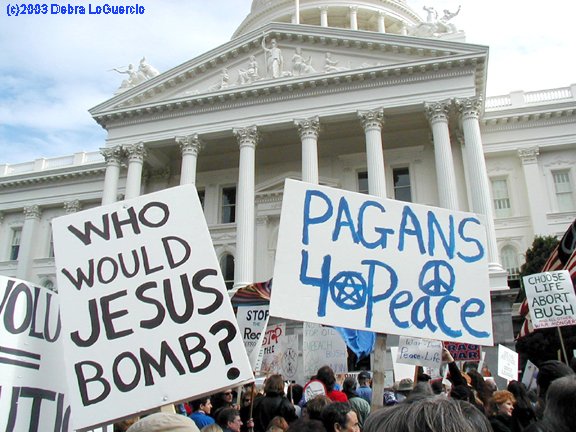Peace rally in Sacramento
By DEBRA LO GUERCIO
©Copyright
2003, Debra Lo Guercio, all rights reserved
Regardless of their beliefs, people stood side by side
on the steps of the state capitol building on February 15th
to express their feelings about war with Iraq.

Express YOUR feelings.
House
Senate
Among the thousands of people who gathered for the peace rally at the state capitol on Saturday, Feb. 15, Winters did not go unrepresented. Some ventured to the rally on their own, while others gathered at City Park and traveled together in a car caravan.
Those who traveled by caravan spent some time chatting and making signs at City Park before heading down the highway to Sacramento.
All had their own reasons for getting involved in the peace rally, one of many that were held not only across the nation on that day but around the world, with an estimated five million people participating globally.
Winters resident Shep Harper said he decided to march on Saturday because the prospect of war frightens him and because he doesn't see any clear connection between Saddam Hussein and the Sept. 11 hijackers. Another woman, who asked to remain anonymous, said her sons marched against the Vietnam war and that she "could do no less against Bush's war."
Teachers were well-represented in the Winters contingent. Teacher Debbie Hickerson recalled the words of Eleanor Roosevelt: "We have to believe in peace and we have to work for peace."
"I'm a teacher and I want to teach peace," said Hickerson. "I don't feel there's any reason to kill innocent people in Iraq."
April Henry, also a teacher, got involved in the peace movement to protest the use of nuclear weapons.
"I don't want nuclear war to happen. I don't want this country to be a trigger for nuclear war," said Henry. "Protecting the American people will not be done by bombing another country."
When asked about her motivations for participating, teacher Rebecca Fridae said simply and quietly, "I think it's the most important thing I can do today."
Al Vallecillo also had a concise reason for marching in the peace rally: to stop the war. He added that he felt it is everyone's job to do the same, and explained why.
"We have an administration that wasn't elected. It is running amok," said Vallecillo. "It is taking our civil liberties and spending our children's future. (Bush) is bankrupting us."
Tim Caro, standing nearby, added his discontent to Vallecillo's comments.
"I want to initiate a process whereby we impeach Bush and get rid of these clowns in the so-called government," said Caro.
Caro was not the only one to express frustration with the government. Sophie Sears, 15, came to march with her parents. Calling the impending war "stupid," Sears said the government is using scare tactics and lies to advance its agenda.
"(Bush) is making up reasons and trying to get everyone scared. And he has a whole bunch of buddies in oil," said Sears.
Aaron Hickerson expressed frustration that the government is ignoring domestic issues in its quest for war.
"I just think there's enough to do domestically," said Hickerson. "We don't need to worry about a country that's 12,000 miles away. We need to improve schools, unemployment and the economy. There are a hundred things that are more important than Saddam Hussein.
"Since Sept. 11, it's all gotten out of control so fast, and it doesn't seem to be ending any time soon."
Shirley Marks chimed in with her own solution to ease tensions between the U.S. and Iraq: negotiation.
"Talk never killed anyone unless it bored them to death," said Marks, who attended the peace march in a black outfit and black veiled hat to symbolize mourning for the dead, and also sported a gold star around her neck to show solidarity with Gold Star Mothers, who wore gold stars during World War II to signify that they had lost a child in battle.
All had their reasons, but Elena Harper, 11, offered the most touching, bittersweet response for speaking out against war.
"It would harm a lot of innocent people, and I know we don't like that from what happened to us on Sept. 11," said Harper. "I don't want that to happen to other people."
As the conversations wrapped up and the finishing touches were put on the signs, the group loaded into their cars and headed east to the capitol. The Winters group joined up with other Yolo and Solano county residents at the west entrance to the Tower Bridge in West Sacramento. Along with five other locations from around the capitol building, groups from all over northern California as well as some from Nevada converged on the capitol like spokes on a bicycle wheel.
As the group filed across the bridge and down Capitol Avenue, many waved their protest signs to the oncoming traffic as they crossed over Interstate 5, with drivers honking their horns in support. The line of people extended from the bridge all the way to the capitol building.
At the steps of the capitol, various speakers voiced their opinions about what is going on in the country as a peaceful and attentive crowd listened, cheered, applauded and waved hand-made signs and banners: "How did our oil get under their sand?"; "War begins with a Dubya"; "White hats don't shoot first"; "Dubya - the worst president we never elected"; and "Our grief is not a cry for war."
Even the words of Jesus, Ghandi and Einstein were recalled on posters: "Blessed are the peacemakers," "An eye for an eye makes the whole world blind" and "You can't simultaneously prevent and prepare for war."
Although the crowd was predominantly middle class and white, people of many colors, races and ages were there. Even the extreme ends of the religious spectrum were represented, as a Christian woman holding a "Who would Jesus bomb?" sign happened to stop next to a woman holding a "Pagans for Peace" sign, and both listened to the speakers side by side.
An American woman served as the emcee and described the national protest as "people marching to create a movement of opposition" who are "mobilized around an agenda of duct tape and fear."
"This government is about profit by any means necessary. We have got to be about a movement that puts people above money," she said, and urged people to find a peace group with which they feel comfortable, and get involved with it or offer financial contributions to help support it.
One of the speakers was an American missionary who had just returned from Iraq, and shared a wish from an Iraqi citizen for all the leaders of the world: "Give them tender hearts to save the world from certain ruin."
California State University professor Richard Becker was among the speakers, and emphasized that the war with Iraq is inextricably linked to the conflict between Palestine and Iraq.
"Any talk about Iraq without talk about Palestine means you have to mutilate reality," said Becker. "We cannot let the Palestinian people stand alone."
Another speaker, an Iraqi, explained that Iraqis do not hate Americans.
"Don't be nervous about Iraq. We welcome you. It's your government that's the problem," he said, and to the U.S. government, he gave this message: "Stop this march to graves and grieving. Leave these tears unshed."
Another Arab speaker urged friendship between Arabs and Americans. Speaking on behalf of his countrymen, he said, "We come to you with all our colors - across all divides, across all religions - we stretch out our hands and say, 'We know you are not our enemy.' We stand shoulder to shoulder with you and say to George Bush, 'No to war.'
"Our voice is clear, from the north to the south, from the east to the west: Ye shall not destroy this world. Ye shall not make us enemies."
Noting that the future belongs to everyone, he emphasized that people around the world "are all connected. All are the same. We are part of a global tree. Our fate is together."
As the man spoke, a group of Syrian men listened attentively among the mostly American crowd. Two-year old Ahmad Kattran, wearing a white headband with a peace symbol, sat quietly on his father's shoulders and sometimes even stood up on them to get a look at the sea of people around him. Meanwhile, his father commented on what he felt was taking place that afternoon.
"It's nice to see people realize the truth and to know exactly what is going on in the world," said Mustafa, saying that the televised American media is biased against the Arab world and usually only offers one side of the story. He confirmed what the speaker had said, that Arabs do not hate Americans.
"The (American) people are very sweet. They are honest and nice," said Mustafa. "They think their administration is the same way, but that is not the case, especially when it comes to foreign policy."
Kattran also agreed that a war in Iraq will damage American relations with the Arab world. If the U.S. attacks Iraq, many Arabs will view it as a war against Islam. It will become a religious war and that will make the situation infinitely worse than a simple fight over oil.
"Once a war is fought under religion, it's hard to put the war down," said Kattran.
 Home Page
Home Page
